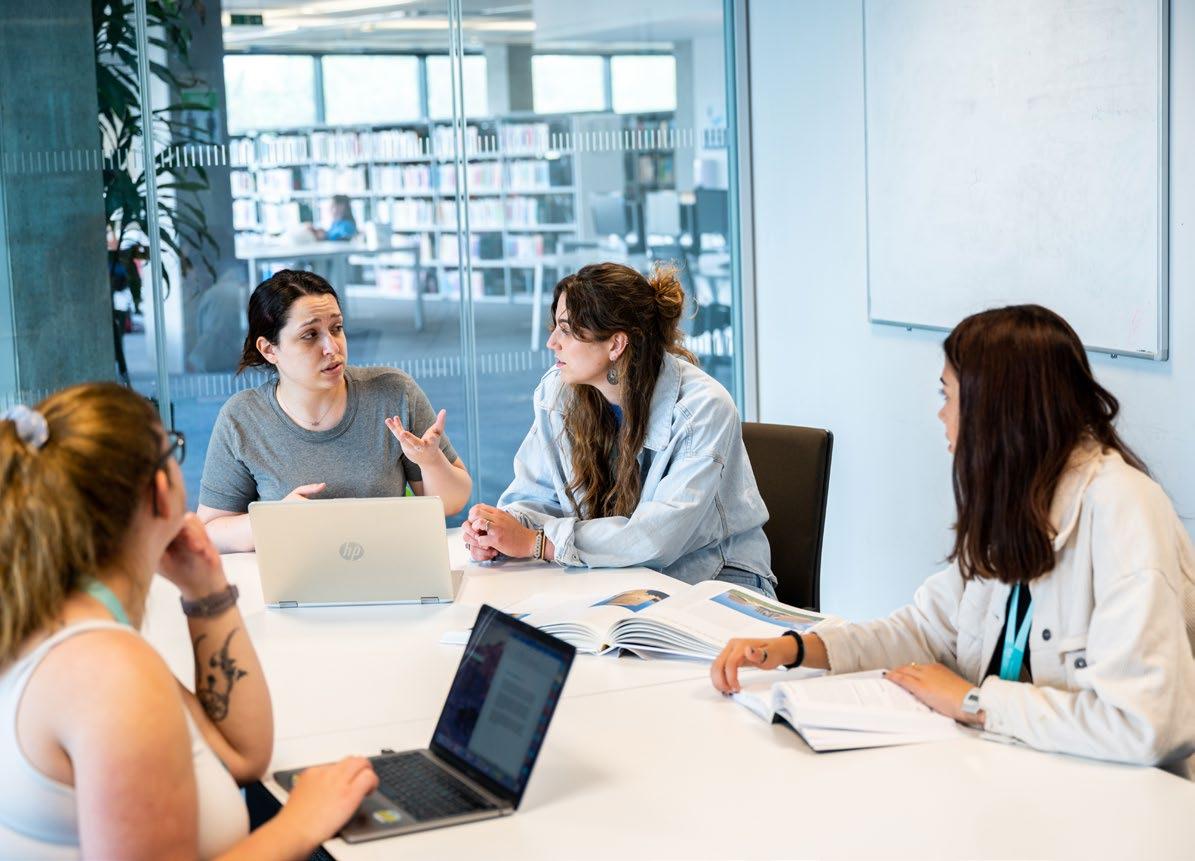BNU BEHAVIOURS FRAMEWORK



BNU has engaged with an aspiration to fully embed a behavioural framework to support a step change needed to improve performance and culture and to deliver our strategic goals while putting students at the heart of everything we do. To benefit fully from the framework the University will seek to embed it across all elements of the people lifecycle including recruitment, PDRs, talent management and learning and development. A programme of development will be offered to support staff engagement with the framework.
This behavioural framework has been developed in conjunction with the Association of University Administrators (AUA) and has been adapted to reflect the needs of BNU through consultation with over 50 members of staff. The framework has been mapped to and supports the refreshed DRIVE values, and further work will be undertaken to map it to the BAF. The AUA developed the professional behaviours in collaboration with a total of 96 professional services staff representing 48 HEIs. The model forms part of the AUA CPD Framework originally published in 2009 and was revised and refreshed in 2016.
The framework provides clarity of expectations on behaviour patterns that distinguish effective performance and ensures colleagues have development opportunities to equip them with the skills and attributes that help us to achieve our vision of being a University with sector- leading impact.
The behaviours are not the tasks associated with a particular job; it provides a clear steer on how an individual does the job, but it does not assume these are the only effective behaviours. The behaviours are universal across all roles, though some are very much more important in some jobs than others.
Each behavioural category has been considered at three levels.
Self: behaviours that may be observed whatever the working situation
Others: behaviours that may be observed when interacting with and influencing others, or when managing colleagues
University: behaviours that may be observed when influencing at University level or representing the University
The framework also identifies behaviours that may indicate a need for further development for each of the behavioural groups. These are offered as a positive tool for self-assessment and reflection.
The behaviours are not the tasks associated with a particular job. They identify how an individual does the job. The behaviours are universal across all roles, though some are very much more important in some jobs than others. The behavioural framework has been designed to clarify what individuals can do to develop in their jobs and beyond - and ultimately to deliver their University’s strategic plan. This framework provides a clear steer on key and valued behaviours. It does not assume that these are the only effective behaviours. No attempt has been made to define the behaviours required at different levels due to the diverse nature of the HE sector and of the needs of individual institutions within it. Institutions may wish to develop the framework in this way for local use, thereby tailoring the levels and requirements to their own specific organisational structure, culture, environment and objectives.
BNU has engaged with an aspiration to fully embed a behavioural framework to help build the desired culture to deliver our strategic goals while putting students at the heart of everything we do. This behavioural framework has been developed in conjunction with the Association of University Administrators (AUA) and has been adapted to reflect the needs of BNU through consultation with over 50 members of staff. The framework has been mapped to and supports the refreshed DRIVE values.
The benefits of embedding the framework include supporting a step change needed to improve performance and culture, providing clarity of expectations and ensuring colleagues have development opportunities to equip them with the necessary skills and attributes that help us to achieve our vision of being a University with sector-leading impact.
The framework highlights behaviour patterns that distinguish effective performance in professional services roles. The AUA developed the professional behaviours through desk research, consultation questionnaires, workshops and focus groups which first took place in 2008. A total of 96 professional services staff representing 48 HEIs were involved in generating the behaviours. The model forms part of the AUA CPD Framework originally published in 2009, and was revised and refreshed in 2016. The behaviours are based on the AUA values.
Being aware of own behaviour and mindful of how it impacts on others, enhancing personal skills to adapt professional practice accordingly.
Providing the best quality service to external and internal customers/students/stakeholders. Building genuine and open long-term relationships in order to drive up customer service standards.
Taking a holistic view and working enthusiastically to analyse problems and to develop workable solutions. Identifying opportunities for innovation.
Being open to and engaging with new ideas and ways of working. Adjusting to unfamiliar situations, shifting demands and changing roles.
Identifying and making the most productive use of resources including people, time, information, networks and budgets.
Enhancing your contribution to the University through an understanding of University values, its students, customers and stakeholders.
Showing commitment to own ongoing professional development. Supporting and encouraging others to develop their professional knowledge, skills and behaviours to enable them to reach their full potential.
Working collaboratively and across boundaries with others in order to achieve objectives. Recognising and valuing the different contributions people bring to this process.
Consistently meeting agreed objectives and success criteria. Taking personal responsibility for getting things done.
DEVELOPING SELF AND OTHERS
DELIVERING EXCELLENT SERVICE
USING RESOURCES EFFECTIVELY
FINDING SOLUTIONS
MANAGING SELF AND PERSONAL SKILLS
ACHIEVING RESULTS
VISIONARY
EMPOWERING
ENGAGING WITH THE WIDER CONTEXT
EMBRACING CHANGES
WORKING TOGETHER
DYNAMIC
We actively influence events, and seek opportunities to provide excellent services to our students, customers and colleagues.

WE WILL:
Positive indicators
• Be open and enthusiastic to new opportunities

• Question barriers to change in a constructive way
• Be flexible and agile
• Always give our best
• Seek new ways of working
Negative indicators
• Indecisive
• Reluctant to try new things
• Not taking others with you
• Obstructing change
• Failing to focus on outcomes
We take personal responsibility for our behaviour and deliver on our commitments to others and the University.
WE WILL:
Positive indicators
• Behave with integrity and transparency
• Be aware of our impact
• Take ownership and be accountable
• Collaborate well with colleagues
• Focus on solutions over problems
Negative indicators
• Being passive
• ‘Turning up’ rather than initiating
• Selfish - ‘passing the buck’
• Negative mindset
• Silo working
We respect and value each other as individuals and actively champion a vibrant, inclusive community that transforms lives.

WE WILL:
Positive Indicators
• Respect and value difference
• Make sure everyone has a voice
• Care for ourselves and others
• Promote an inclusive culture always
• Invest in personal wellbeing
Negative indicators
• Focussing on failure
• Prejudiced/biased behaviour
• Favouritism
• Sarcasm
• Lack of communication
VISIONARY
We embrace change and are brave in taking calculated risks to support the growth of the University in the wider community
WE WILL:
Positive indicators
• Foster new ideas from any source

• Strive for continuous improvement
• Set aspirational goals
• Be enterprising and commercial
• Adopt a mindset of curiosity
Negative indicators
• Stagnant/inertia
• Not embracing opportunities
• Hindering creativity and challenge
• “This is the way it’s always been done round here”
• Risk averse
We listen to others to establish understanding and encourage the freedom to excel.
WE WILL:
Positive indicators
• Recognise and reward ideas

• Show ‘it’s alright to make mistakes’
• Nurture development
• Work effectively with colleagues
• Adopt a growth mindset
Negative indicators
• Not listening
• Undermining others’ initiatives
• Blaming others
• Failing to collaborate with others
• Inhibit others’ growth
Being aware of own behaviour and how it impacts on others and the goals and objectives of the University.
Demonstrating University values.
Enhancing personal skills to adapt professional practice accordingly.


VALUES LINKS TO:

• Being well prepared and engaged in all planned activities.
• Demonstrating an awareness of own values, motivations and emotions.
• Keeping up to date with what is happening in professional area.
• Having an enthusiastic and positive ‘can-do’ approach.
• Maintaining a healthy work life balance, being mindful of your own wellbeing.
• Speaking and writing by using clear succinct language.
• Showing consistency between words and actions.
• Being self-motivated.
• Accepting and demonstrating personal responsibility for health and safety other compliance areas.
• Giving and receiving constructive feedback as part of normal day-to-day work activity.
• Developing and maintaining personal networks of contacts.
• Ensuring own behaviour, words and actions support a commitment to equality, diversity and inclusion.
• Chairing meetings effectively, ensuring everyone has an opportunity to contribute.
• Getting the best from others through effective communication.
• Managing own response when faced with challenging situations.
• Ensuring that own behaviours consistently provide a positive role model.
• Applying personal skills appropriately to represent the University positively.
• Recognising personal accountability to the organisation through your work and interactions.
• Taking ownership for developing and implementing University strategy.
• Talking or writing at inappropriate length.
• Focusing almost exclusively on own job or function.
• Being consistently late for, not prepared for or not engaging fully in planned events and activities.
• Missing deadlines without explanation.
• Reacting defensively to constructive feedback.
• Ignoring the views and suggestions of others.
• Slow or lack of response to reasonable requests.
Making every contact count by providing the best quality service to all our customers (Internal Customers, Students and all our Stakeholders).
Building genuine and open long-term relationships in order to improve customer services.


VALUES LINKS TO:

• Resolving problems quickly in a courteous and purposeful manner.
• Ensuring systems and processes are kept up to date.
• Delivering what you promise.
• Setting appropriate boundaries and managing expectations.
• Identifying opportunities for flexibility and agility.
• Being up to date with best customer/student/ stakeholder service practice, using insight, market intelligence and digital technology.
• Engaging positively with quality customer service assessment processes.
• Identifying measures of success
• Consistently giving positive messages about the University.
• Seeing things from your customers/student/ stakeholders’ viewpoint.
• Listening, questioning and clarifying in order to understand your customers/student/ stakeholders’ needs.
• Using customer/student/ stakeholder feedback to drive improvements.
• Tailoring communication to meet customers/student/ stakeholders’ needs.
• Setting aspirational goals and fostering a continuous improvement philosophy.
• Delivering consistent service standards.
• Empowering others to deliver excellent customer service.
• Overuse of University jargon, including acronyms.
• Adopting a ‘one size fits all’ approach.
• Not taking a person centric approach and hides behind processes.
• Providing anonymous service by withholding name or contact details.
• Ignoring customer/stakeholder feedback.
• Defining excellent service for internal and external customers.
• Interpreting rules and regulations flexibly to balance customer/ student/stakeholder and organisational needs.
• Advocating for and role modelling excellent service to your customers/students/ stakeholders.
Taking a holistic view and working enthusiastically to analyse problems and develop workable solutions.


Identifying opportunities for innovation.
VALUES LINKS TO:
• Taking time to understand and diagnose problems by considering the whole picture.
• Not always seeking perfection at the expense of a timely solution.
• Spotting an opportunity and taking action to do something about it.
• Working pro actively and taking initiatives.
• Suggesting and trying out new approaches.
• Identifying risks and considering consequences of failure in advance.
• Balancing new ideas with tried and tested solutions.
• Making decisions and taking responsibility for them.
• Supporting others to find their own solutions rather than giving all the answers.
• Fostering a culture which encourages people to take acceptable risks in pursuing innovation.
• Coaching and guiding others in developing and implementing innovative solutions.
• Sharing learning and experience to facilitate others’ decision making.
• Seeking input from others to develop team solutions.
• Championing business cases and plans for ideas submitted by members of the team.
• Encouraging and developing the creativity of others and recruiting and selecting creative people.
• Giving people the space and freedom to be creative.
• Abdicating responsibility for resolving issues.
• Going for the ‘easy’ solution.
• Being open to and applying good practice and fresh ideas from inside and outside the University .
• Exercising judgement in line with organisational strategy and priorities .
• Actively seeking new ideas and approaches from outside the University .
• Identifying and pursuing opportunities to work in partnership with external organisations to generate and develop ideas.
• Doing things the way they have always been done without reviewing them.
• Overlooking the potential repercussions of setting precedents.
• Putting obstacles in the way of innovation.
• Failing to acknowledge or consider solutions proposed by others.
Being open to and engaging with new ideas and ways of working. Adjusting to unfamiliar situations, shifting demands and changing roles.

VALUES LINKS TO:


• Accepting that change is an integral part of life.
• Demonstrating a willingness to do things differently.
• Making suggestions for improvement.
• Actively participating in activities aimed at improvement.
• Taking a creative approach to change which challenges assumptions and is not based purely on enhancing existing practice.
• Viewing change situations as opportunities for improving and developing work.
• Remaining positive about moving forward despite being realistic about the challenges presented by change.
• Demonstrating that ‘the way things are done here’ does not restrict you.
• Challenging the status quo in a constructive way.
• Seeking a diversity of perceptions.
• Encouraging others to initiate and embrace change
• Encouraging realistic experimentation and new ways of working.
• Consulting with stakeholders on change where appropriate.
• Providing ongoing support and encouragement to others who are developing and testing solutions.
• Articulating the purpose of change and the context within which change is happening.
• Adapting approach to respond to changes outside of the University.
• Communicating change in a positive manner through influencing and persuasion.
• Recognising, respecting and acknowledging others’ responses to change.
• Inspiring and motivating others to engage as a team member in identifying and implementing change.
• Unable to move beyond negative reaction to uncertainty.
• Complaining instead of doing something about it.
• Refusing to engage with change activities, e.g. training, briefings.
• Creating a climate that encourages innovation and receptivity to change.
• Leading by example in supporting the University to break with traditional methods.
• Communicating upwards to influence policy formulation.
• Embracing new technologies, techniques and working methods.
• Modifying departmental/ organisational strategy to adapt to changes in the wider environment.
• Consistently blocking change and failing to build on others’ ideas for change.
• Generating numerous ideas but not following any of them through.
• Agreeing to change but not following through with action.
• Not taking personal responsibility where appropriate.

Identifying and making the most productive use of resources including people, time, information, networks and budgets.

VALUES LINKS TO:

• Using resources in ways that are efficient and minimise any adverse impact on the environment.
• Being aware of the financial and commercial aspects of the University.
• Integrating ethical considerations into decision making about use of resources .
• Using internal networks and channels of communication to inform and support objectives.
• Using a commercial approach to bid and negotiate for resources.
• Effective use and distribution of management information to inform decisions.
• Considering cost benefit analysis implications of decisions.
• Making use of information and resources gained through personal networks.
• Recognising that time is cost and adjusting behaviour accordingly.
• Understanding resource availability.
• Liaising effectively with external bodies, suppliers and other HE bodies.
• Identifying the appropriate information and knowledge people require and appreciation of why.
• Drawing on others’ knowledge, skills and experience.
• Collaborating outside of immediate work area to maximise use of resources within the University.
• Deploying resources efficiently, at the right levels and in appropriate ways.
• Delegating appropriately.
• Considering costs when planning delivery of services.
• Reviewing workloads to ensure the health and wellbeing of others.
• Sharing good practice within the University.
• Being mindful of responsibility to stakeholders in effective use of resources.
• Developing cross-service collaboration and being willing to share resources.
• Identifying ways in which resources can be used flexibly and imaginatively for the benefit of the whole University.
• Always going for the highest quality solution regardless of cost implications.
• Re-inventing the wheel.
• Assuming staff time is free.
• Failing to fully utilise available resources.
• Wasting resources.
Enhancing your contribution to the University through an understanding of organisational values, its students, customers and stakeholders.

VALUES LINKS TO:
 Visionary
Visionary
• Recognising how your work may impact at all levels across the University.
• Keeping abreast of sector wide and organisational developments.
• Being clear about how own role fits in the University.
• Demonstrating University values through the ways that you work.
• Creating and articulating a purpose for own area of responsibility.
• Taking an active interest in the way the University works to improve customer service.
• Actively seeking engagement with your stakeholders, including Alumni.
• Making clear for others the links between individual, team, department and University objectives.
• Providing clarity about your own responsibilities and accountabilities and those of others in relation to the wider context.
• Creating momentum and enthusiasm about the role of the team within the wider University.
• Consistently promoting and being a role model for the University values.
• Ensuring plans are consistent with the values and objectives of the University.
• Keeping sight of the vision in dealing with day-to-day pressures.
• Encouraging a University wide perspective through joined-up thinking and working.
• Creating a sense of common purpose.
• Scanning the wider environment to seek opportunities to develop the University.
• Understanding and adapting to the wider context.
• Identifying and mitigating for possible scenarios that could adversely impact on the University.
• Getting bogged down in irrelevant detail – unable to see the wood for the trees.
• Being too internally focused.
• Continually focusing on short-term issues at the expense of long term goals.
• Working in isolation.
Supporting and encouraging others to develop their professional knowledge, skills and behaviours to enable them to reach their full potential.

VALUES LINKS TO:
Empowering

• Using all situations as potential learning opportunities.
• Devoting time to own development.
• Making time to reflect upon own performance and learning on an ongoing basis.
• Applying learning to enhance everyday professional practice.
• Setting yourself ambitious and stretching development goals to continuously improve and maintain high performance.
• Engaging in formal and informal learning and development activities.
• Engaging positively with the PDR process.
• Seeking, accepting and learning from feedback.
• Providing constructive feedback to colleagues at all levels.
• Feeling confident to admit mistakes.
• Giving praise for work well done.
• Making time to nurture the development of colleagues.
• Encouraging and supporting others to capture their learning and identify how it can be applied to improve individual and team performance.
• Ensuring equal access to development opportunities for all.
• Using delegation as an opportunity to develop others.
• Empowering others by locating decision making at the lowest possible appropriate level.
• Providing creative work opportunities to stretch and develop colleagues.
• Encouraging others to learn from mistakes without blame.
• Encouraging colleagues to take calculated risks.
• Coaching and mentoring others.
• Supporting succession planning by identifying and developing colleagues with high potential.
• Supporting others to undertake alternative duties, short-term secondments etc.
• Encouraging others to contribute to institutionallevel activity.
• Identifying the changing needs of the University and incorporating these into own and others’ development plans.
• Failing to invest in own and others’ development
• Blocking the progress of high potential colleagues
• Believing that ‘development’ equals ‘training’ and not engaging with informal development opportunities
• Being intolerant of mistakes and apportioning blame
• Focusing on others’ weaknesses rather than their strengths
Working collaboratively and across boundaries with others in order to achieve objectives. Recognising and valuing the different contributions people bring to this process. Responsible


VALUES LINKS TO:

• Proactively developing productive working relationships across the University.
• Monitoring and reviewing the effectiveness of working relationships.
• Interacting with others in ways that add value.
• Demonstrating that you value differences in people.
• Knowing where your responsibility ends and that of others begins.
• Presenting own opinions and the interests of those you are representing at meetings in a clear and concise way.
• Establishing rapport to improve working relationships.
• Seeking out opportunities for collaborative working.
• Co-operating willingly to support the achievement of team goals.
• Using understanding of other people’s perspectives to help reach agreement.
• Sharing information and keeping others informed.
• Recognising and respecting the roles, responsibilities, interests and concerns of colleagues and stakeholders.
• Proposing and negotiating solutions.
• Giving and receiving constructive feedback.
• Enabling and encouraging people to express their views and ask questions.
• Addressing conflicts early so that they may be dealt with.
• Ensuring that working arrangements, resources and processes respond to different needs, abilities, values and ways of working.
• Interrupting when others are speaking.
• ‘Guarding’ information or using knowledge as power.
• Discouraging debate.
• Giving priority to own personal goals.
• Presenting other people’s ideas as your own.
• Not acknowledging others’ ideas.
• Using inappropriate language.
• Using a bullying style of writing/speaking/behaviour.
• Working across boundaries to develop relationships with other teams.
• Challenging inappropriate or exclusive practices/ behaviour.
• Reflecting University values in dealing with people and conducting business.
• Building and sustaining collaborative relationships with other organisations.
Consistently meeting agreed objectives and success criteria. Taking personal responsibility for getting things done. Responsible


VALUES LINKS TO:

• Being clear about your role and responsibilities.
• Planning and organising workloads to ensure that deadlines are met within resource constraints.
• Proactively identifying success criteria.
• Maintaining a high standard of work even when under pressure.
• Being confident to ask for help in the face of setbacks.
• Incorporating flexibility into plans and adjusting them in light of developments.
• Keeping track of a number of activities running simultaneously.
• Distinguishing between important and urgent tasks and prioritising effectively.
• Being knowledgeable about colleagues who will influence the work you do.
• Taking time to celebrate successes.
• Winning support of key colleagues and other stakeholders.
• Being effective in engaging others without having any direct authority.
• Monitoring progress and providing regular updates.
• Recognising others’ contribution to the achievement of objectives and giving credit to others.
• Taking personal responsibility for delivering on commitments made to others.
• Ensuring that your actions are aligned with the University’s strategic objectives.
• Saying ‘no’ to activities that are less important or do not fit with University priorities.
• Evaluating the success of projects and disseminating lessons that can be learned.
• Believing that talking about things is the same as action.
• Being disorganised.
• Failing to see things through.
• Over-committing and not delivering.